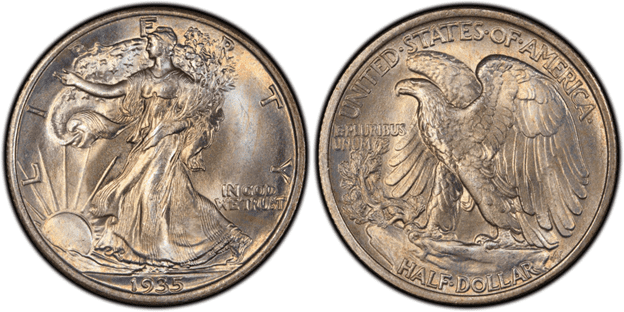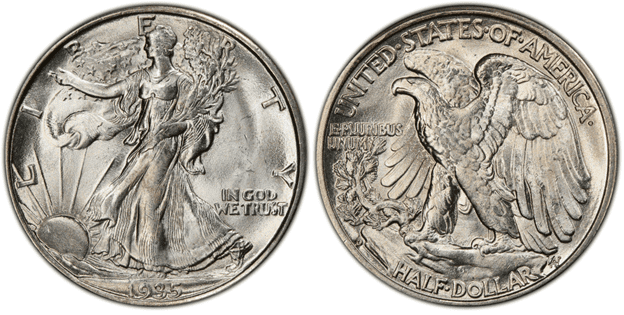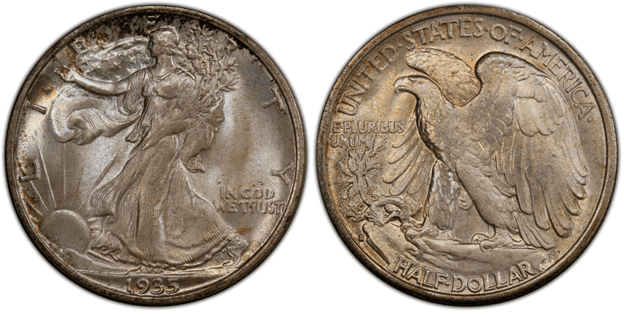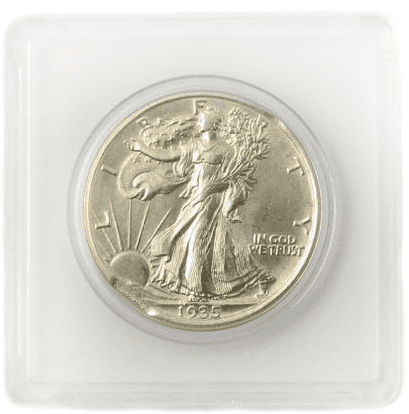What Makes A 1935 Walking Liberty Half Dollar Valuable?
The 1935 Walking Liberty half dollars are valuable as silver bullion and numismatic items.
Early in the 20th century, the Walking Liberty Half Dollar was first minted. With their high quality and striking design, these coins altered both the way in which US inhabitants conducted commerce and how they saw money and largely helped to start the world of coin collecting in the USA.
Even though these coins have not been minted for decades, they’re still highly sought after by collectors.
Adolph A. Weinman created the Walking Liberty Half Dollar US coins at the beginning of the 20th century.
From 1916 through 1947, these coins were produced, and in 1948, Franklin half dollars took their place.
The walking liberty half-dollar coin was deemed one of the most attractive coins by art expert Cornelius Vermeule. Additionally, Weinman’s design was changed for the American Silver Eagle’s obverse side.
Lady Liberty is seen walking while clutching oak and laurel branches on the obverse side of the Walking Liberty half-dollar coins.
The bottom left side of the coin depicts a woman with a US flag over her shoulder and the sun beaming on the eastern horizon. The text featured on the front of this coin includes ‘in god we trust’, ‘liberty’, and the year.
On the back of the design, a bald eagle perched atop a mountain with its wings spread is depicted. On the rock at the left bottom of the tail side of the coin, there is also a tiny mountain pine sapling poking through a crack.
The text on the reverse side of the coin reads; ‘United States of America’, ‘E. Pluribus Unum’, and ‘Half Dollar AAW’.
A half-dollar coin from 1935 is made up of 90% of silver and 10% of copper.
The weight in grammes, diameter, and thickness of the walking liberty half dollars from 1916 to 1947 are 12.5 gm, 30.63 mm, and 1.8 mm, respectively. These coins have reeded edges.
In 1935, the United States was still experiencing the Great Depression, with unemployment remaining at 20.1%, and war loomed as Germany started to rearm and passed the Nuremberg Laws, which denied Jews civil rights. In this year, the Boulder (Hoover) Dam was also constructed.
Amelia Earhart was the first woman to fly alone across the Pacific Ocean, and the China Clipper delivers the first piece of airmail across the region. Last but not least, a technicolour Mickey Mouse short film debuts in the entertainment world.
Where Is The Mint Mark On A 1935 Half Dollar?
The 1935 D and 1935 S half dollars, together with the 1935 half dollar without a mint mark (Philadelphia), were all produced by the US. The lower left side of the coin’s reverse bears the mint mark if it is present.
1935 Walking Liberty Half Dollar Series
1935 Dollar No Mint Mark
Year: 1935
Face Value: $0.50
Composition: 90% silver and 10% copper
Total Weight: 12.50 g
Diameter: 30.63 mm
Thickness: 1.8 mm
Edge: Reeded
Minted in: Philadelphia
Quantity Minted: 9,162,000

1935 D Half Dollar
Year: 1935
Face Value: $0.50
Composition: 90% silver and 10% copper
Total Weight: 12.50 g
Diameter: 30.63 mm
Thickness: 1.8 mm
Edge: Reeded
Minted in: Denver
Quantity Minted: 3,003,800

1935 S Half Dollar
Year: 1935
Face Value: $0.50
Composition: 90% silver and 10% copper
Total Weight: 12.50 g
Diameter: 30.63 mm
Thickness: 1.8 mm
Edge: Reeded
Minted in: San Francisco
Quantity Minted: 3,854,000

List of Errors
There aren’t any widespread errors seen in the 1935 series of walking liberty half dollars, however, the coins in this year, particularly those struck in Denver, were known to be of poor quality, which means that well-struck coins from this year are much more highly sought after.
The errors seen in 1935 walking liberty half dollar, are on a coin by coin basis, such as the miss-struck example featured below.

How Much Is A 1935 Liberty Half Dollar Worth Today?
As of July 4, 2022, this coin’s silver melt value is $7.22. This is based on the current spot price of $19.96 for an ounce of silver, this melt value has been determined.
The table below was curated by Coin Study and shows how broadly the value of the 1935 walking liberty half dollar fluctuates, from around the melt value for those in good condition to $225 for the San Francisco struck coin in uncirculated condition.

How Does The Grading System Work?
The Sheldon Scale is used by numismatists to provide a numerical value to coins. The Sheldon Scale goes from poor (P-1) to perfect mint state (P-1) (MS-70). Coins were originally evaluated using words to reflect their condition (Good, Fair, Excellent, Etc.). Unfortunately, coin collectors and dealers had different ideas about what each of these terms represent.
Professional numismatists joined together in the 1970s and established CoinGrading standards. These numismatists now assign grades at key places on the seventy-point scale, using the most regularly utilized numeric points in conjunction with the original adjective grade. The following are the most common coin grades:
-
-
- (P-1) Poor – Indistinguishable and probably damaged; if used, must have a date and mintmark; otherwise, rather battered.
- (FR-2) Fair – Nearly smooth, but without the damage that a coin graded Poor often possesses. The coin must have enough detail to be identified.
- (G-4) Fair – Inscriptions have merged into the rims in some areas, and important elements have been mostly erased.
- (VG-8) Very Good- A little weathered, but all of the primary design elements are visible, albeit faintly. There is little if any, central detail left.
- (F-12) Good – The item is very worn, yet the wear is even, and the overall design details stand out clearly. Rims are almost completely isolated from the field.
- (VF-20) Very Fine – Moderately weathered, with some finer features still visible. The motto or all letters of LIBERTY are readable. Both sides of the coin have entire rims that are separated from the field.
- (EF-40) Extremely Fine – Gently used; all gadgets are visible, and the most important ones are bold. The finer details are bold and clear, however, light wear may be seen.
- (AU-50) Uncirculated – Slight evidence of wear on the coin’s design’s high points; may have contact marks; eye appeal should be adequate.
- (AU-58) Uncirculated Choice – Slight traces of wear, no severe contact marks, almost full mint shine, and great eye appeal.
- (MS-60) Mint State Basal – Strictly uncirculated; no indication of wear on the coin’s highest points, but an unsightly coin with reduced luster, visible contact marks, hairlines, and other flaws.
- (MS-63) Mint State Acceptable – Uncirculated, but with contact scratches and nicks, little reduced shine, but otherwise appealing appearance. The strike is weak to average.
- (MS-65) Mint State Choice – Uncirculated with great mint shine, very little contact blemishes, and exceptional eye appeal. The strike is unusually severe.
- (MS-68) Mint State Premium Quality – Uncirculated with superb luster, no obvious contact marks to the naked eye, and exceptional eye appeal. The strike is quick and appealing.
- (MS-69) Almost Perfect Mint State – Uncirculated with perfect brilliance, a sharp and appealing strike, and extremely good eye appeal. A near-perfect coin with minor imperfections in the planchet, strike, and contact markings (seen only under 8x magnification).
- (MS-70) Mint State Perfect – Under 8x magnification, there are no tiny imperfections discernible; the strike is crisp, and the coin is perfectly centered on a beautiful planchet. Rarely seen on a coin, this coin is bright and whole, with original luster and exceptional eye appeal.
-
Where To Buy Or Sell 1935 Half Dollars?
Because of their notable silver value, many people collect 1935 half dollars when the value of silver is low, hoping to create a future nest egg for themselves.
Due to this, it’s not too uncommon to find these half dollars at pawnbrokers or silver dealers, although the condition of these examples are likely to be much lower to coincide with the melt value.
These coins can also be found at online marketplaces such as eBay or Etsy, and these coins can be purchased reasonably, particularly if you’re lucky with an auction bid.
Speaking of auctions, for high-value coins such as uncirculated quality or error coins, online auction houses and coin specialists make the best place to buy and sell 1935 walking liberty half dollars. Coins sold in these locations are assessed and graded, giving you complete peace of mind.
FAQs
What is the most valuable Walking Liberty half dollar?
Aside from unique error variants, the San Francisco struck coin in uncirculated condition in uncirculated condition commands the highest price.
Which Kennedy half dollars are most valuable?
A 1964 Kennedy Half Dollar set a record price of $108,000 in a 2019 Heritage Auctions public sale of rare U.S. coins, making it the most expensive coin of its kind.
Are 1935 half dollars worth anything?
Yes, due to the high silver content, the 1935 half dollar has a melt value alone of $7.72, let alone its numismatic value.
